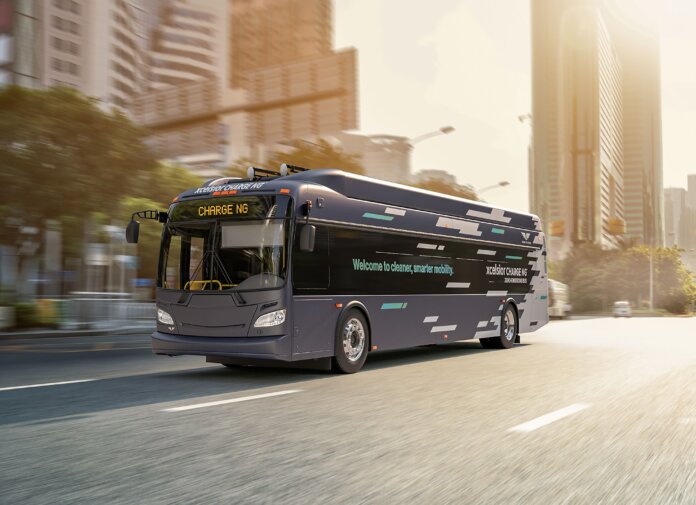New Flyer of America Inc., a subsidiary of NFI Group Inc., an independent global bus manufacturer, has unveiled its next-generation battery-electric Xcelsior CHARGE NG heavy-duty transit bus, built on the Xcelsior platform.
Based on North America’s first low-floor transit bus introduced by New Flyer in 1991, the Xcelsior was launched in 2009 with over 16,000 delivered to date. Having surpassed 4.5 million service miles with its battery-electric Xcelsior CHARGE and fuel cell-electric Xcelsior CHARGE H2 buses, New Flyer says it applied zero-emission design, performance, research and ingenuity to develop its newest electric bus.
New Flyer’s Xcelsior CHARGE NG incorporates three distinct technology advancements to deliver a high-performance bus, including next-generation high energy batteries that extend range up to 13%, advanced protective battery packaging designed for easy install and simpler serviceability, and a new lightweight electric traction drive system with up to 90% energy recovery.
“The Xcelsior CHARGE NG includes a streamlined design that reduces maintenance, increases energy density and improves energy recovery while significantly reducing weight – offering a lighter, more energy-efficient and longer-range electric bus,” says Chris Stoddart, president of New Flyer. “As electric vehicle demand continues to build, so too has our innovation. With better manufacturability, higher energy recovery, fewer parts and improved system durability, our Xcelsior CHARGE NG is a high-performance bus that is more sustainable and easier to maintain.”
New Flyer manufactures its own batteries in its bus production facilities. The battery packaging, developed by New Flyer, utilizes a single waterproof enclosure design and offers weight reduction and simpler maintenance, decreasing the number of parts by 90%. Its streamlined approach also allows technicians to simply “plugin” or “unplug” individual battery packs, significantly reducing bus downtime and allowing easy replacement as needed in the future.
High-energy, long-range batteries utilize an active liquid cooling system to maintain temperature and respond quickly to increases in power demand and environmental loads. The batteries are also better insulated, lending optimal temperature maintenance, prolonged battery life and greater power efficiency. The Siemens ELFA 3 traction system delivers up to 90% energy recovery and weighs 69% less than ELFA 2, allowing greater passenger capacity and offers a more efficient design through compact inverters and embedded drive controllers.
New Flyer says it also operates the VIC, the first and only innovation lab of its kind dedicated to advancing bus technology and providing essential workforce development through electric bus training, now available online.
For information on the VIC, click here.





